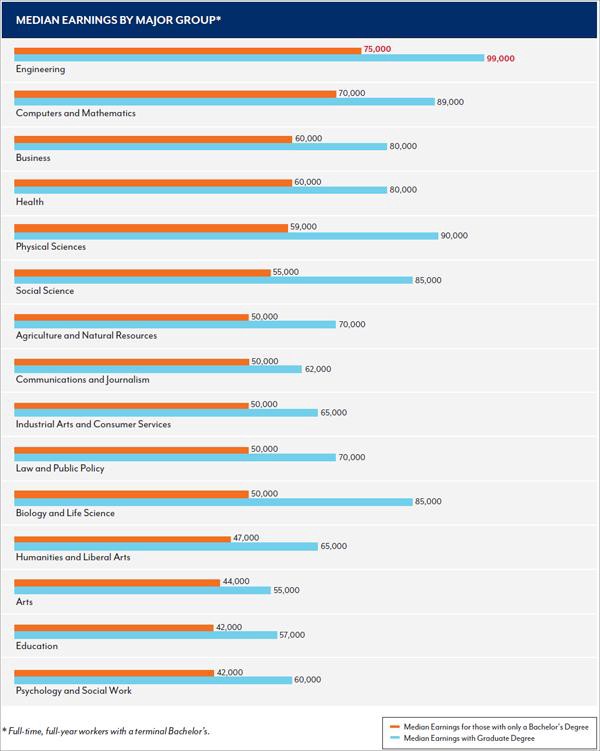The Earning Potential of a Liberal Arts Degree
Are your parents upset by your liberal-arts degree? Show them this chart. pic.twitter.com/baqksCrEwT
— Chronicle (@chronicle) August 23, 2014
Okay, so a few things about this tweet from The Chronicle of Higher Education that has been making the rounds:
• Where is the data from? Who knows — the article related to this chart is behind a paywall.
• Median wage at age 36 for liberal-arts degree holders is higher than the median household income of $53,891 in June of this year (household income being the combined income of anyone over the age of 15 and earning money, as measured by the U.S. government).
• If I showed this chart to my parents they’d shrug and say, “So? Why are you showing us a chart when you should be showing us a paycheck?” (And who could argue with that.)
For better context, try this report and chart from Georgetown’s Center on Education and the Workforce on the worth of a college major:

Planet Money re-ran a podcast episode last week called, “What’s Your Major?” which examined the idea that students are often more focused on what school they want to go to rather than what they will major in, and nothing is stopping a student attending a state school from earning a desirable salary upon graduation if she chose the right major (though they acknowledge the power of the Ivies, and that an English major at Harvard can go on to be an investment banker and earn tons of money if she wants simply through the power of the Ivy League name and making the right connections).
The Planet Money reporters spoke to a student who studied psychology and worked service jobs until landing a job doing counseling and social work and posed the following question to him: What if your college’s course catalog listed each major and included data showing expected median earnings for graduates? Would that have had an effect on how you chose your major?
“It still wouldn’t have,” he said. “I came to this school knowing where I wanted to go and what I wanted to do. I didn’t necessarily know the road and how to get there and the steps that I’d have to take, but nothing can turn me away from counseling. Honestly, I don’t mind the money — it’s more of a fulfilling thing for me.”
This is a good thing, of course, because if everyone was focused solely on the question of earnings, we wouldn’t have social workers or teachers or public service workers dedicated to make our communities a better place.
And what if you were a liberal arts major who did mind the money?
I had tiger parents who were constantly badgering me into pursuing medicine or law — career paths where I could, well, show them a paycheck. And I was actually on the law school track until a professor — who had Pulitzer! — convinced me I should try reporting instead. My mother, literally, cried.
Neither of us could see the financial crisis coming, nor know that the legal job market would slow so dramatically. Too many lawyers, not enough jobs (this could happen to anyone — even you STEM majors!).
Nor could we foresee a future where I’d go from earning less than $30K working in public radio to earning more than twice that at one tech company after another (and as a writer no less!). And if you were to tell me, back then as a newly minted graduate, that I’d be attending a one-week, all expenses paid trip where among other things, I’d be learning how to code, I would have responded, “Who, me?” And yet, that is what I’ll be doing next month.
My point being that if your parents are upset by your liberal arts degree, instead of showing them that Chronicle chart, you can show them this post and remind them that you were hard-working and capable enough to get yourself into college and earn a degree, and that you’re capable of figuring it out and earning a decent salary too; that you’re capable of becoming an engineer if you want to; that you can go work for a tech company if you want to and maybe help change its sexist culture because you read Jane Eyre in one of your liberal arts classes and had serious, thoughtful discussions about proto-feminism, class systems, and women and labor. And then you can send them a copy of your pay stub, or a photo of you and the class of students you’re teaching, or you can shrug and say, “hey, it’s my life.”
Support The Billfold
The Billfold continues to exist thanks to support from our readers. Help us continue to do our work by making a monthly pledge on Patreon or a one-time-only contribution through PayPal.
Comments